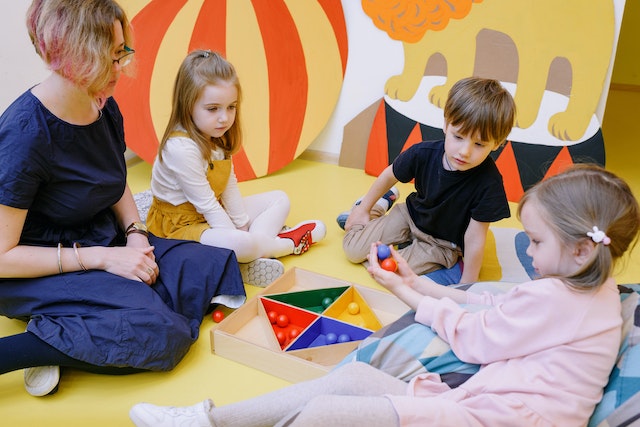Being a parent, your role as your child’s primary and significant educator is extremely important. Your active involvement in their education can significantly impact their success and enjoyment of IB program elementary school in Chesapeake. Multiple studies have shown that family involvement is a more reliable predictor of academic success than a family’s economic status or parents’ education level. With that in mind, if your child is currently enrolled in the challenging IB elementary school, you can rely on the following practical tips and guidance to help you promote your child’s learning and growth at home.
Tips for parents of IB elementary school students
Familiarize yourself with key figures
Take the time to get to know the various individuals who play a role in your child’s kindergarten. From administrators to counselors to support staff, each person contributes to your child’s learning, social development, and overall IB elementary school experience — understanding who can help you navigate the school environment more effectively.
Stay engaged through parent-teacher conferences
Schools typically hold one or two yearly parent-teacher conferences. Attend these meetings to gain insights into your child’s progress, strengths, and areas for improvement. Additionally, don’t hesitate to invite your child’s teacher for a visit or reach out via notes or phone calls whenever you have concerns or questions. If you need language support, request a translator from the school or bring a friend along.
Stay informed about your child’s progress
Inquire about ways you and the IB primary school can assist if your child struggles, particularly in subjects like reading. Regularly check their report card to stay updated on their academic achievements.
Seek special services when needed
If your child is facing learning difficulties, don’t hesitate to request an evaluation from the school. Ask for an assessment in your child’s strongest language, and the teacher may provide appropriate accommodations in the classroom. If a learning disorder is identified, your child can receive additional support at no cost.
Foster a positive homework routine
Demonstrate to your child that education is a priority by emphasizing the importance of completing homework daily. Set aside a designated study area, establish a consistent homework time, and minimize distractions like television and phone calls. Even if you feel uncertain about the subject matter or language, show interest and support by helping your child get organized, providing necessary resources, asking about their assignments, checking completed work, and praising their efforts.
Seek homework assistance if needed
If you find it challenging to assist your child with homework or IB elementary school assignments, explore alternative options. Contact the school, tutoring groups, community services, local churches, or libraries to inquire about after-school programs or tutoring services. You can also ask an older student, neighbor, or acquaintance for help.
Prepare your child for exams
Assessments play a significant role in determining a student’s progress. Throughout the IB primary school year, your child will likely take standardized exams, and their teacher will dedicate class time to test preparation. As a parent, you can support your child’s learning habits daily before and after exams. Encourage them to adopt effective study techniques, provide a nurturing environment for learning, and help them feel more at ease when it’s time to be tested.
Embrace what the school provides
- Take the time to read the information sent home by the school.
- If possible, seek resources and communication in your native language to ensure a clear understanding.
- Connect with other parents to learn about the different services and programs offered by the IB primary school. Your child might discover a passion for music, enjoy an after-school activity, join a sports team, or benefit from tutoring programs.
- Stay informed and keep a record of the various activities available throughout the school year.
Nurture a positive attitude towards education
Our words and actions shape our children’s attitudes towards school and learning. By demonstrating our value for education and showcasing how we apply it daily, we provide them with strong examples that significantly contribute to their academic success. Let’s show our children that learning can be enjoyable, rewarding, and worthwhile.
Keep an eye on media consumption
American children often spend more time watching TV, playing video games, and using the Internet than engaging in school-related activities. It’s essential to monitor their media habits to ensure a healthy balance. Provide guidance on effectively and responsibly using media while emphasizing the importance of homework and other educational pursuits.
Cultivate a love for reading
One of the most powerful gifts we can give our children is the joy of reading. Reading is crucial for academic success and opens doors to lifelong learning. Encourage your child to embrace reading and explore various genres. Let them experience the magic of books and inspire their imagination.
Engage in meaningful conversations
Communication is vital to a child’s school performance. By actively listening and engaging in conversations with our children, we help them develop essential language skills necessary for academic achievement. Children with ample opportunities to express themselves and engage in dialogue are likelier to become proficient readers and attentive learners. Show your child that their thoughts and opinions are valued.
Utilize the library’s power
Libraries are magical places of knowledge and exploration. Libraries offer a quiet space for completing homework and opportunities for discovery and intellectual growth. Encourage your child to embrace the wonders of the library. Help them understand the resources available and foster their independence as learners.
Foster responsibility and independence
Accountability and independent thinking are crucial for school success. Establish clear guidelines and consistently reinforce them with your child. Encourage them to take ownership of their actions at home and school. Teach them to break tasks into manageable steps and support their after-school, evening, and weekend routines. Encourage communication by having them check in with you and share their plans.
Cultivate active and diverse learning
Learning goes beyond textbooks and classrooms. Encourage your child to explore different avenues of knowledge actively. Active learning involves asking questions, problem-solving, pursuing interests, and engaging in extracurricular activities such as sports, music, or museum visits. Embrace interactive discussions and encourage their curiosity. Foster an environment where your child feels comfortable sharing their thoughts and ideas. Promoting this dynamic exchange enhances your child’s engagement and interest in their education.
Incorporating these engaging strategies into your parenting approach empowers your child to thrive academically and develop a lifelong love for learning. Remember, your involvement and support are crucial in shaping their educational journey.
Conclusion
As parents, we can shape our children’s educational journey and set them up for success. We can make a remarkable difference in their lives by embracing an engaging and human approach.
Let’s be their biggest cheerleaders, showing unwavering support and enthusiasm for their education. Let’s establish meaningful connections with their teachers, understanding that open communication and collaboration are the pillars of a thriving learning environment.
Encourage their curiosity, foster a love for reading, and create opportunities for active learning. By nurturing a positive attitude towards education and showcasing its relevance in our lives, we inspire them to believe in themselves and their potential.
But it doesn’t end there. Let’s be present, involved, and advocate for their needs. Let’s explore the resources their school offers, volunteer, and join the vibrant parent-teacher community. Together, we can create a nurturing educational ecosystem that empowers our children to soar.
Remember, as parents, we are not just spectators but active participants in their educational journey. So, let’s embrace this role wholeheartedly and watch our children flourish, knowing that our guidance and support make all the difference. Let’s build a future full of endless possibilities for our beloved learners with IB program elementary school in Chesapeake.




